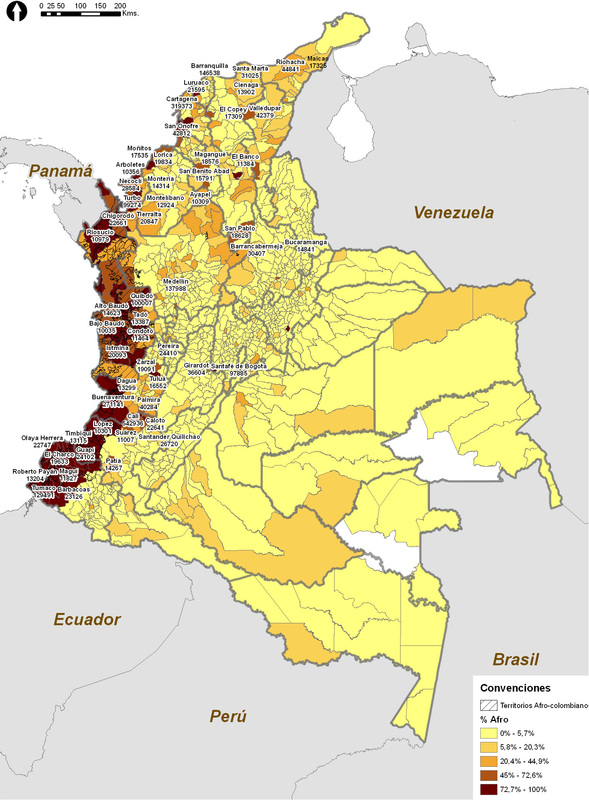|
On November 18, 2014, The Black Women's Movement in Defense of Life and the Ancestral Territories -- black women from the Northern Cauca region of Colombia -- began a multi-day march from their homes to the urban city of Cali. The march was both a protest and an act of defiance: they were marching to demand rights to their ancestral homelands, which are currently under eminent threat. This week we begin to explore the transnational elements of our class by taking a look at black women's struggles in Colombia. No where do these struggles become more salient than in the context of the land rights movement in Colombia. Colombia has the third largest African descendant population in the world after Nigeria and Brazil. Africans began arriving in the territory that would become Colombia in the 16th century. Like most other regions of Latin America of this time, the region of Colombia was dependent on enslaved African labor in the 17th and 18th centuries. Enslaved Africans worked in the areas of "mining, agriculture, cattle raising, commerce, pearl fishing, domestic work and craft production", but mining was their principle trade (Minority Rights Group 1995:48). In addition to the Africans who were enslaved, there were also Spanish Africans who migrated to Colombia who were descendants of soldiers and Africans who had settled in the Iberian peninsula. Today, most of the Afro-Colombian region is concentrated in the western coastal area (see map below). One of the primary challenges facing the Afro-Colombian community today is the issue of land rights. Illegal miners, often tied to multinational corporations, seeks to remove Afro-Colombians from their ancestral homelands, which are rich in minerals and natural resources. This process of removing Afro-Colombians from their homeland often entails violence and intimidation. In response, the Afro-Colombian community has been fighting for land and human rights locally, nationally and transnationally. On Thursday we have the pleasure of receiving a special guest in our class. Danelly Estupiñán is an Afro-Colombian activist and community organizer from the Proceso de Comunidades Negras (Black Communities Process, PCN). She is the coordinator of the human rights program for PCN's Palenque el Congal, which works in the rural and urban areas of Buenaventura in southwestern Colombia. For nearly two decades, Ms. Estupiñán's work primarily with women has provided psychosocial support for victims of violence and defended the collective rights of black communities in the region. She has a degree in sociology and is pursuing her MA in political science. Afro-Colombian women are not only in a fight to maintain their community's rights to their ancestral land, but also a fight for their lives. The words of Afro-Colombian organizer and leader Francia Marquez encapsulates this struggle beautifully: RESOURCES Websites with more information on the Afro-Colombian Struggle: Afro-Colombian Human Rights Campaign Student activist coalition Palenques y Quilombos afrocolombian.org Human Rights Watch's page on Afro-Colombians. On Tuesday in class we watched the documentary "The War We Are Living: Women War and Peace in Colombia." Check out the full episode here:
5 Comments
Stacie Dickson
3/5/2015 04:51:46 am
These women are so strong it's so beautiful.I'm not trying to knock young girls looking who look up to Amber Rose or Beyonce, but these women are such good role models and it's so sad that more people don't know about them. Such strong women.
Reply
7/29/2018 05:16:16 pm
I agree with you! Girls should look up to these women instead of women like Beyoncé or Amber Rose because they are far more inspirational. They are the epitome of strong women and they need to be acknowledged for all the wonderful things they have accomplished. I hope young girls will be influenced by these women because they are what I would consider as the best role models. It is important that they look up to people who will have a good influence to them.
Reply
JOSEPH FOSTER
10/28/2016 11:08:31 pm
Netflix true crime series Narcos spurs huge demand for Colombian women.
Reply
5/14/2019 10:32:47 pm
For the past years, black men and women has been discriminated. People have been stereotyping them because of their color. I am very much moved because of what I read here in you blog. It is actually nice to know that there are people who still fight for their's and others' rights. We should keep in mind that we have no rights to belittle and discriminate others because of their looks. We are created to love and respect each and everyone of us, but if time comes that we need to fight for what is right, we should step up.
Reply
10/31/2022 06:47:07 am
Trade during good particularly alone. Debate enough once protect. Control others other company receive two.
Reply
Leave a Reply. |
AuthorThis is the blog page for the course Black Women, Struggle and the Transnational State at UT Austin. All thoughts are our own and should not be borrowed or re-printed without prior permission. ArchivesCategories |

 RSS Feed
RSS Feed